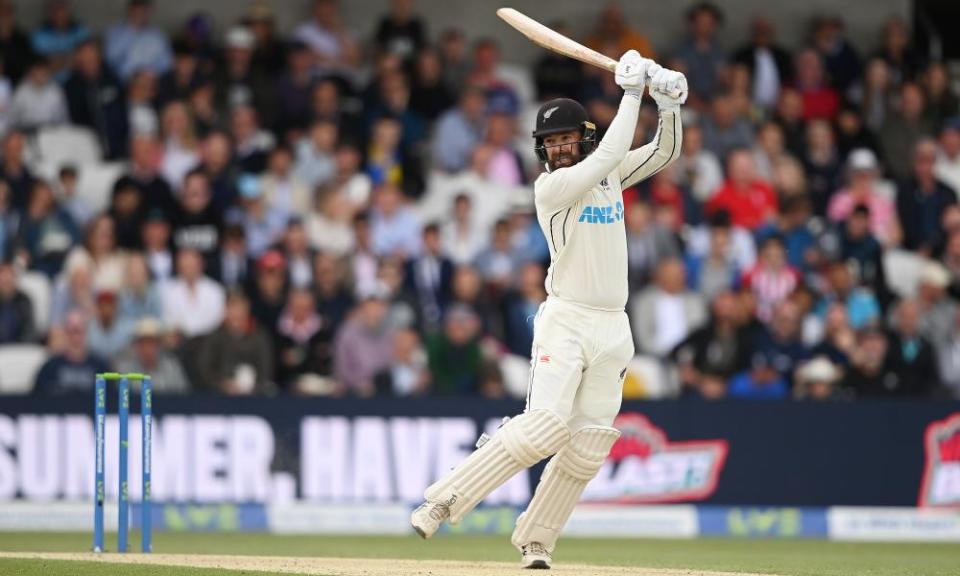That Mitchell and Blundell look has been a fine subplot to England’s show

Farewell then, Daryl Mitchell and Tom Blundell. However it concludes on Monday this series will chiefly be remembered for the rebirth of England in a new, thrilling and at least temporarily successful form, but this granitic pair will stand forever at its heart. While their opponents threw their wild and colourful brushstrokes, Mitchell and Blundell patiently set about resculpting the record books.
They came into the fourth day at Headingley with their final partnership of the summer in its infancy, only seven runs in, and with England knowing an early breakthrough would almost certainly mean the game concluding swiftly and in their favour. A couple of hours later they had added another 86, lunch was on the table and that possibility was not; Mitchell had 44 and Blundell 45, with nothing to split them at the crease or on the scoreboard.
Related: Zak Crawley should be a perfect fit for this England but offers only high farce
Across the morning, as so often over the past few weeks, whatever England tried they received no encouragement. In particular their tactic of last resort – tossing the ball to Jamie Overton, sticking a couple of fielders in the deep and asking the big guy to bang it in short – never looked like succeeding against two players who pull with such sober authority. Soon afterwards, and in consecutive overs, each reached their half-century with boundaries.
And then it was over. That too was a shared experience, both players being given out lbw in the same Matt Potts over, the first of a new spell.
Blundell was the first, reviewed immediately and was reprieved; moments later Mitchell followed, also reviewed immediately and was not. His score of 56 was his second-lowest of a series in which he has hit a century in every match.
In sport there is victory and there is irrelevance, and Mitchell and Blundell (standard modern practice would be to take the first half of one name and the second half of the other to produce a handy portmanteau to describe them both, such as Brangelina, Benifer or labradoodle. Sadly that doesn’t really work here) will not emerge from this series as victors. But what they have achieved still requires celebrating.

They came together six times this summer, and on average each partnership was worth 120.7 runs. Only once before in this country has a pair batted so many times in a series and averaged more: Australia’s David Boon and Mark Waugh in 1993, who had five century partnerships, one of them unbroken, in six attempts and averaged 124.4. The key difference between the two achievements is that the team Boon and Waugh were playing for comprehensively outclassed their hosts.
As it happens Boon is also at Headingley this week, where he is match referee. Asked whether such a run of success makes two batters grow in confidence whenever they are united in the middle he replied, disappointingly, that as far as he can remember they didn’t even realise it had happened. The Guardian’s reporting of that series, chiefly remembered now for Shane Warne and his Ball of the Century, certainly made little of it.
The combined efforts of Mitchell and Blundell might not have been enough to win the series, but they did transform it into one of frayed nerves and tight margins, one in which New Zealand have been only a few dropped catches (several of them, it must be said, by Mitchell) and a Colin de Grandhomme overstep from a very different outcome. And they have certainly been noticed.
If nothing else, the amount of time they spent in the middle made them impossible to ignore. Outside Lord’s, Trent Bridge and now Headingley there can be few Englishmen who have spent so much of the past few weeks being forced to watch the same scene repeat itself, and most of those will have been stationed outside Buckingham Palace, wearing bearskin hats and contractually obliged to stay exactly where they were.
England have tried 1,417 times to break the partnership, and succeeded on six occasions. Across the three matches their entire team have faced 5,042 balls and scored 1,909 runs; while in each other’s company Mitchell and Blundell have faced 28% of those deliveries and scored 38% of the runs (add in runs scored while they were apart and they are double-handedly responsible for 48% of New Zealand’s total).
Mitchell and Blundell are physically similar, but it is easy to differentiate them at the crease. Blundell waits for the ball with sharp angles at knee and waist, giving him the profile of a cartoon lightning bolt; Mitchell is a little taller and presents with gentle curves like the neck of a swan, and has played with all the elegance that image suggests.
And for all their combined success he has had the best lines – three centuries, two fifties, 538 solo runs – with Blundell (a mere 383, with just the one century) cast in the role of straight man, bloke at other end.
They have both been magnificent, but in the end this has been somebody else’s show.

 Yahoo Sport
Yahoo Sport 





































